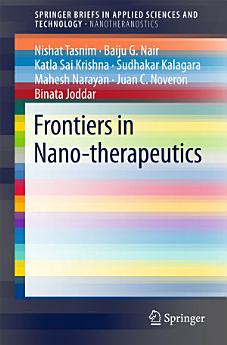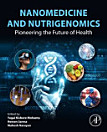Frontiers in Nano-therapeutics
Nishat Tasnim · Baiju G. Nair · Katla Sai Krishna · Sudhakar Kalagara · Mahesh Narayan · Juan C. Noveron · Binata Joddar
2017年6月 · Springer
電子書
82
頁
report評分和評論未經驗證 瞭解詳情
關於本電子書
This brief highlights recent research advances in the area of nano-therapeutics. Nanotechnology holds immense potential for application in a wide range of biological and engineering applications such as molecular sensors for disease diagnosis, therapeutic agents for the treatment of diseases, a vehicle for delivering therapeutics and imaging agents for theranostic applications, both in-vitro and in-vivo. The brief is grouped into the following sections namely, A) Discrete Nanosystems ; B) Anisotropic Nanoparticles; C) Nano-films/coated/layered and D) Nano-composites.
關於作者
Nishat Tasnim is a Ph.D. candidate in the Department of Materials Science and Engineering Program at University of Texas at El Paso. She received her Master’s degree in Electrical Engineering from University of Texas Rio Grande Valley in 2016 with excellence. While pursuing her Master’s degree, she fabricated handcrafted ECoG devices, micro peripheral nerve scaffold and neural interface device to receive signal from peripheral nerve. She presented research in Neural Regeneration conference, Bioscience research collaborative and published her research work in Engineering Journals, MDPI and in IEB. Her present research interests are biomaterials and neural tissue regeneration for Parkinson’s disease treatment.
Baiju G Nair is working as SPDR fellow (Program for young scientist) at Nanomedical Engineering Laboratory in RIKEN. He obtained his doctoral degree, securing the MEXT fellowship, in Bio-nano fusion science technology from the Bio-nano Electronics Research Centre, Toyo University, Japan. During the time, his research was recognized with international awards and grants. After the doctoral degree, Dr. Nair awarded the prestigious JSPS fellowship to work in RIKEN. His research focuses on the nanobiology, nanomaterial and tissue engineering. He published most of the research articles in many peer reviewed journals. In addition to his role as a researcher, Nair is currently involved in various academic and administrative positions in Japan.
Katla Sai Krishna is a research scientist in the Department of Chemistry at University of Texas at El Paso. He received his Ph.D. in Materials Science from Jawaharlal Nehru Center for Advanced Scientific Research, India in 2011. After graduating, he pursued postdoctoral research in the Nanofabrication and Nanomaterials group at Center for Advanced Microstructures and Devices (CAMD), a Synchrotron Light Source at the Louisiana State University (LSU), USA. His research at LSU was part of the Center for Atomic-Level Catalyst Design, a DOE sponsored Energy Frontier Research Center (EFRC). During this period, his research focused on (i) Atomically precise gold nanoclusters and their application in catalysis and magnetism (ii) Millifluidics-based lab-on-a-chip devices for synthesis and in situ time-resolved characterization of nanomaterials. Later, he worked as a research scientist in the 3D-Nanostructuring group at Institute of Physics & Institute of Micro- and Nanotechnologies (IMN), Technische Universität Ilmenau, Germany.
Binata Joddar is an assistant professor of Metallurgy, Materials and Biomedical Engineering at UTEP. Dr. Joddar received her PhD from Clemson University (SC), from the joint Bioengineering program between Clemson and The Medical University of South Carolina in the year 2006. Following this she received post-doctoral training in cardiovascular biology and disease at The Ohio State University in the Department of Biomedical Engineering where she was awarded with 'Distinguished Post-Doctoral Researcher' award. She then attained a 'Foreign Post-Doctoral Fellowship' from the renowned research institute RIKEN in Japan to work with stem cells and regenerative medicine. She has published numerous research articles and reviews in high impact journals and is also well cited. She also serves as an Editor for Scientific Reports (Nature PG) and a reviewer for Biomaterials, Acta Biomaterialia, and Tissue Engineering. Her research expertise is in the areas of biomaterials & stem-cell based tissue engineering; to explore and solve problems in cardiovascular and neural tissue regeneration.
Mahesh Narayan is an associate professor and assistant chairman at the Department of Chemistry in the College of Sciences at UTEP. In summary, he has authored and co-authored 51 research and review articles and book chapters in the areas of free radical biology, protein-structure function, oxidative folding and protein misfolding, halogen bonding and in silico drug design. His work has been recognized through invitations to speaking engagements in over 15 international forums and by recognition in a variety of media outlets. Currently, he serves on the Editorial Board of PLOS One and Cell Biochemistry and Biophysics (Springer). He has delivered invited talks at the Institute of NanoChemistry and NanoBiology of Shanghai University. His research interests include understanding the mechanisms underlying Parkinson’s disease including proteins such as β-amyloid, which leads to S-nitrosylation of PDI and aggregation of Parkinsonian biomarkers.
Juan C. Noveron is Ralph and Kathleen Ponce de Leon Professor of Chemistry at the Department of Chemistry in the College of Sciences at UTEP. Dr. Noveron's research is focused on supramolecular chemistry, which is the field that studies intermolecular interactions that lead to structures beyond the molecule (supramolecular structures), and is considered to be the basic science of nanomaterials. His research group focuses on the design, synthesis, and characterization of molecules with self-organizing behavior that spontaneously self-assemble into nanoscale metal-organic materials with applications in medicine and green energy systems. The applications that Dr. Noveron’s group targets with this approach are (1) the delivery of antigen genes for DNA-vaccine applications, (2) the development of new gene-sensing platforms using self-organized DNA-Carbon Nanotubes, (3) the development of new self-organized metal-organic solar cells, (4) the development of new water-treatment technologies, and (5) the development of new bio-inspired 3-D printable hydrogels with antibacterial properties. Dr. Noveron collaborates with researchers from other disciplines to evaluate the function of our molecular designs and carry out experiments such as cytotoxicity assays, DNA-transfection, in-vivo DNA-delivery, gene-sensing, desalination and water treatments, photovoltaics, and antibacterialassays.
為這本電子書評分
歡迎提供意見。
閱讀資訊
智慧型手機與平板電腦
筆記型電腦和電腦
你可以使用電腦的網路瀏覽器聆聽你在 Google Play 購買的有聲書。
電子書閱讀器與其他裝置
如要在 Kobo 電子閱讀器這類電子書裝置上閱覽書籍,必須將檔案下載並傳輸到該裝置上。請按照說明中心的詳細操作說明,將檔案傳輸到支援的電子閱讀器上。




